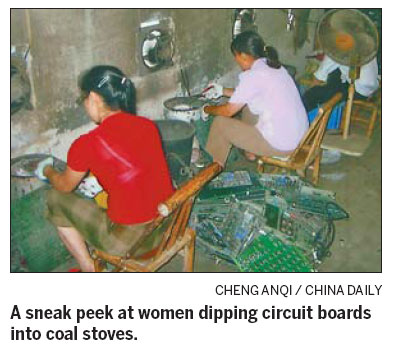Notes from the underground

Reporter's log | Cheng Anqi
The suspicious man has been following me all day. But he seems torn between his fears that I'm an undercover reporter and of missing a business opportunity. I, in turn, am juggling fears of what he'll do if he figures out my true identity and of missing the chance to witness firsthand the lives of workers in the illegal e-waste processing that dominates Guangdong province's Guiyu town.
"You don't look like a dealer," he says. "You look like a journalist."
I swallow my anxiety when he asks, "How many circuit boards did you say you have?"
I offer him a cigarette. That surprises and relaxes him.
"Why not check out our storehouse to see if you want to stash your stuff there?" he offers, residual skepticism still audible in his voice.
The business slump might be driving him to take more risks.
Everyone in Guiyu seems to be complaining about the drop in international copper prices following the global recession that's corroding e-waste recycling's profitability.
"It's hard to run the business these days," says the man, whom I learn is named Li He.
A ton of copper sold for about 80,000 yuan ($12,368) before 2008's economic downturn but now goes for just 50,000 yuan. About 60 kg of copper can be extracted from a ton of circuit boards.
"The collectors we buy from haven't dropped their prices," Li says. "That chews into our profits."
Li ushers me into a 30-square-meter e-waste processing workshop, where a dozen women are hunched over, dipping circuit boards into coal stoves.
The sulfuric stench bites my eyes.
"We keep the iron front gate half open," migrant worker Huang Yan explains, as she deposits a blistering circuit board into the flames.
"It lets some of the fumes out and keeps most of the journalists' cameras out. We're more afraid of the media than the smoke."
I gulp as I recall coverage of two foreign reporters beaten by about 30 hired goons, who stole their secretly filmed video in Guiyu in March 2006.
I decide to keep my camera in my bag - for now, at least.
I perch on a stool next to Huang to see the process.
But while I've infiltrated the shrouds of secrecy protecting the trade, I can't see through the tears shielding my eyes from its noxious emissions.
"How can you stand it?" I ask.
"You can't at first," Huang says. "But you get used to it."
About 15 minutes later, Li steps out to take a call.
I have just enough time to steal a photo of the women's backs.
Soon after, I leave the workshop and step out into the otherworldly cityscape that is Guiyu's Beiling village.
Residents tell me virtually everybody who lives here migrated from elsewhere to find work, while the natives have moved elsewhere to escape the pollution but occasionally stop in to check on their e-waste businesses.
At 1 pm every day, the otherwise quiet streets rumble with hundreds of motorcycles ridden by e-waste workers. Soon after, the pair of pipes that jut from virtually every building start burping soot.
Guiyu's position as the country's e-waste processing base comes from its history of frequent flooding. Starting in the 1950s, inhabitants of this coastal city discovered scavenging for recyclables - from feathers to broken glass - after the frequent inundations to be profitable.
This tradition made Guiyu a natural place to dismantle the shipments of e-waste sent from Western countries after China's reform and opening-up in the 1980s. A growing abundance of domestically collected gizmos followed.
I think about this history during the hour and a half taxi ride along dirt roads to my hotel.
A convoy of container trucks loaded with what I suspect to be toxic plastic shards passes by.
"They're probably heading for the toy companies," the driver says.
I hope he's wrong.


















